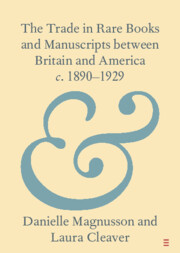3 results
3 - The Pull of Company Science to London
- from Part I - The Making of Company Science, 1600–1813
-
- Book:
- Monopolizing Knowledge
- Published online:
- 02 January 2025
- Print publication:
- 16 January 2025, pp 59-100
-
- Chapter
- Export citation

The Trade in Rare Books and Manuscripts between Britain and America c. 1890–1929
-
- Published online:
- 12 August 2022
- Print publication:
- 08 September 2022
-
- Element
- Export citation
Chapter 2 - ‘Supporting Mutual Benevolence’
-
-
- Book:
- Institutions of Literature, 1700–1900
- Published online:
- 30 June 2022
- Print publication:
- 21 July 2022, pp 44-64
-
- Chapter
- Export citation

